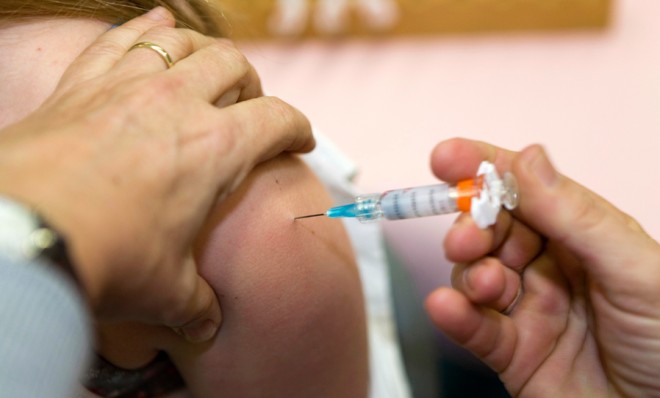Scientists: The HPV vaccine works
The CDC found a huge drop in the prevalence of HPV among teenage girls


A free daily email with the biggest news stories of the day – and the best features from TheWeek.com
You are now subscribed
Your newsletter sign-up was successful
Attention, Michele Bachmann: The HPV vaccine does not make you retarded.
To the contrary, it could lead to a significant reduction of cervical cancer cases. The rate of infections of HPV (human papillomavirus) in young American women has been cut in half since the introduction of the vaccine, according to a new study by the Centers for Disease Control and Prevention.
Since the vaccine was introduced in 2006, the prevalence of HPV infections has dropped to 3.6 recent, from 7.2 percent, among girls aged 14 to 19. The study, published in the June issue of The Journal of Infectious Diseases, concluded that the HPV vaccine had proven incredibly effective at preventing the spread of the virus, which is the leading cause of cervical cancer.
The Week
Escape your echo chamber. Get the facts behind the news, plus analysis from multiple perspectives.

Sign up for The Week's Free Newsletters
From our morning news briefing to a weekly Good News Newsletter, get the best of The Week delivered directly to your inbox.
From our morning news briefing to a weekly Good News Newsletter, get the best of The Week delivered directly to your inbox.
"This report shows that HPV vaccine works well, and the report should be a wake-up call to our nation to protect the next generation by increasing HPV vaccination rates," said Tom Frieden, director of the CDC.
The results surprised researchers because the U.S. has a relatively low HPV vaccination rate compared to other countries. Only about a third of American girls aged 13 to 17 have been fully vaccinated. In other developed countries, those rates have reached around 80 percent. Even Rwanda, through a national campaign aimed at expanding access to all immunizations, has hit the 80 percent threshold.
Health officials partly attributed the unexpectedly precipitous drop to "herd immunity," in which a spike in the vaccinated population makes it less likely the rest of the population will be exposed to the virus.
Another possible explanation is that the vaccine is more effective than previously thought, even in partial doses. The CDC recommends a series of three shots over six months; half of all teenage girls in the U.S. have received at least one dose.
A free daily email with the biggest news stories of the day – and the best features from TheWeek.com
Every year, HPV causes about 19,000 cases of cancer in women. The CDC, citing the nation's comparatively low vaccination rate, said upping the rate could prevent thousands of additional incidences of cancer every year.
"Our low vaccination rates represent 50,000 preventable tragedies — 50,000 girls alive today will develop cervical cancer over their lifetime that would have been prevented if we reach 80 percent vaccination rates," Frieden said. "For every year we delay in doing so, another 4,400 girls will develop cervical cancer in their lifetimes."
HPV also annually causes 8,000 cases of cancer in men. Actor Michael Douglas memorably brought the issue to national prominence earlier this month when he revealed that his throat cancer was the result of HPV contracted via oral sex.
HPV vaccination rates differ widely across the country. In 2007, Texas Gov. Rick Perry (R) made his state the first in the nation to require that all young women get the vaccine — though he later called that decision a "mistake" when campaigning for president.
Conspiracy theories, religious objections, and other concerns about the safety of vaccines have helped keep vaccination rates low in the U.S. Perry's fellow failed presidential candidate, Rep. Michele Bachmann (R-Minn.), attacked him over his HPV mandate during a GOP primary debate, and claimed that the vaccine had made a supporter's daughter mentally retarded.
Jon Terbush is an associate editor at TheWeek.com covering politics, sports, and other things he finds interesting. He has previously written for Talking Points Memo, Raw Story, and Business Insider.
-
 Samurai: a ‘blockbuster’ display of Japanese heritage
Samurai: a ‘blockbuster’ display of Japanese heritageThe Week Recommends British Museum show offers a ‘scintillating journey’ through ‘a world of gore, power and artistic beauty’
-
 BMW iX3: a ‘revolution’ for the German car brand
BMW iX3: a ‘revolution’ for the German car brandThe Week Recommends The electric SUV promises a ‘great balance between ride comfort and driving fun’
-
 Munich Security Conference: a showdown between Europe and Trump?
Munich Security Conference: a showdown between Europe and Trump?Today’s Big Question Report suggests European leaders believe they can no longer rely on the US for military support – but decoupling is easier said than done
